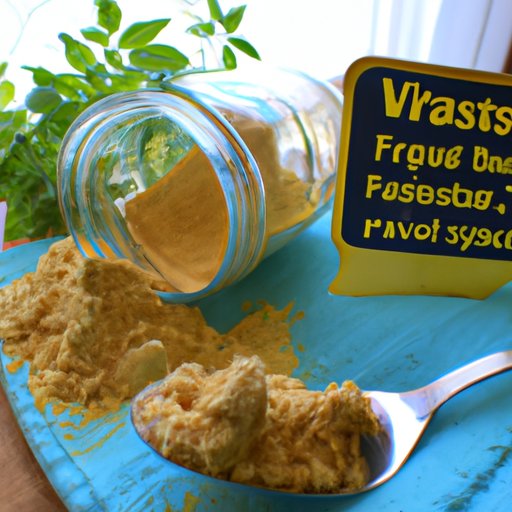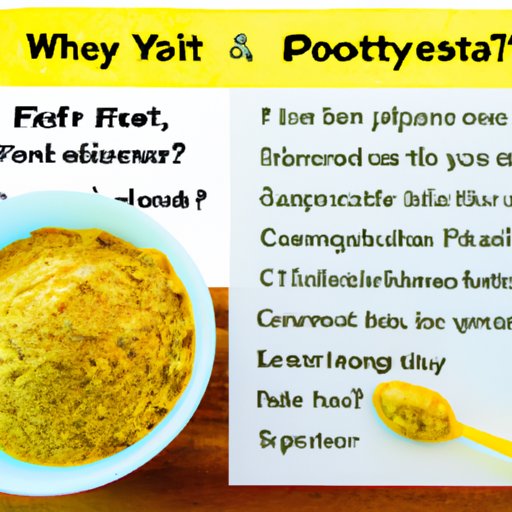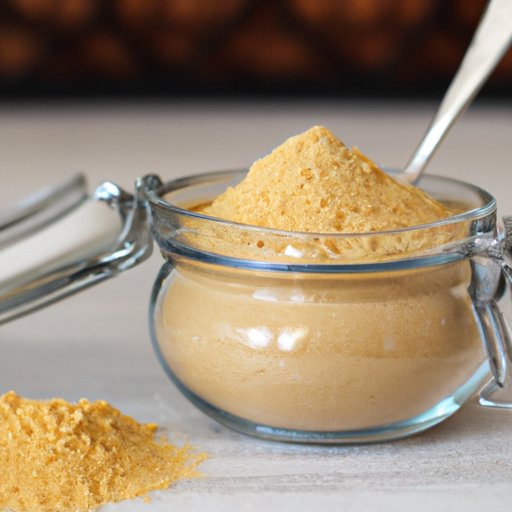Introduction
Nutritional yeast is a type of deactivated yeast made from sugar cane and beet molasses. It’s often used as a condiment or seasoning in many dishes, including salads, sauces, and soups. It’s also a popular vegan alternative to cheese, thanks to its nutty, cheesy flavor profile. But what are the health benefits of nutritional yeast?

Exploring the Health Benefits of Nutritional Yeast
Nutritional yeast is rich in vitamins, minerals, and antioxidants, which can provide numerous health benefits. Here’s a closer look at some of these benefits.
Vitamins and Minerals
Nutritional yeast is an excellent source of several B-complex vitamins, including thiamin, riboflavin, niacin, vitamin B6, and folate. These vitamins play an important role in maintaining healthy nerve function and energy levels. Additionally, nutritional yeast provides other essential vitamins and minerals, such as zinc, magnesium, and selenium.
Potential Benefits for Gut Health
Nutritional yeast contains plant compounds called beta-glucans, which may help improve gut health by supporting beneficial bacteria in the digestive tract. One study found that supplementing with beta-glucans improved gut health markers in people with irritable bowel syndrome (IBS).
Antioxidants
Nutritional yeast is also a good source of antioxidants, which are compounds that help protect cells from damage caused by free radicals. Studies have shown that consuming foods high in antioxidants may reduce the risk of chronic diseases, such as heart disease, cancer, and diabetes.
What is Nutritional Yeast and How Can It Help Improve Your Health?
Nutritional yeast is available in several forms, including flakes, powder, and granules. It has a nutty, cheesy flavor and can be added to many dishes, such as salads, soups, and sauces, to add a savory taste. It’s also a popular vegan alternative to cheese.
Types of Nutritional Yeast
Nutritional yeast comes in two main varieties: fortified and unfortified. Fortified nutritional yeast contains added B-complex vitamins, while unfortified nutritional yeast does not. Both varieties are considered healthy, but fortified nutritional yeast may provide additional health benefits.
Nutrition Profile of Nutritional Yeast
Nutritional yeast is low in calories and fat but rich in vitamins and minerals. A 1-ounce (28-gram) serving of fortified nutritional yeast provides 60–100% of the RDI for several B-complex vitamins, including thiamin, riboflavin, niacin, vitamin B6, and folate. It also contains other essential vitamins and minerals, such as zinc, magnesium, and selenium.

The Pros and Cons of Eating Nutritional Yeast
Nutritional yeast can provide several health benefits, but it also has some drawbacks. Here’s a closer look at the pros and cons of eating nutritional yeast.
Pros
Nutritional yeast is low in calories and fat but rich in vitamins and minerals. It’s also a good source of plant compounds, such as beta-glucans, which may help improve gut health. Additionally, it’s a popular vegan alternative to cheese and can be used to add flavor to many dishes.
Cons
Nutritional yeast is high in sodium, which may be a concern for people on salt-restricted diets. Additionally, some people may be sensitive to nutritional yeast, which can cause digestive issues, such as gas and bloating. If you experience any adverse effects, you should stop using nutritional yeast and consult your healthcare provider.
Is Nutritional Yeast a Good Source of Vegan Protein?
Nutritional yeast is a good source of vegan protein. Here’s a look at the macronutrients in nutritional yeast and the advantages and disadvantages of using it as a protein source.
Macronutrients in Nutritional Yeast
A 1-ounce (28-gram) serving of nutritional yeast provides 8 grams of complete protein, which is equivalent to 16% of the recommended daily value. It’s also a good source of dietary fiber, providing 4 grams per serving.
Advantages of Using Nutritional Yeast as a Protein Source
Nutritional yeast is a convenient and easy way to add protein to your diet. It’s also cholesterol-free and low in fat and calories. Additionally, it’s a complete protein, meaning it provides all nine essential amino acids.
Disadvantages of Using Nutritional Yeast as a Protein Source
Nutritional yeast is high in sodium, so it may not be suitable for people on salt-restricted diets. Additionally, it’s not a good source of certain essential amino acids, such as lysine and methionine, which are found in animal proteins.
How to Incorporate Nutritional Yeast into Your Diet
If you’re interested in trying nutritional yeast, here are some ideas for adding it to your meals and tips for buying and storing it.
Ideas for Adding Nutritional Yeast to Meals
Nutritional yeast can be used in a variety of ways. Try sprinkling it on salads, roasted vegetables, pasta dishes, or popcorn for a nutty, cheesy flavor. You can also use it to make vegan sauces and dressings, or add it to smoothies for a boost of protein and vitamins.
Tips for Buying and Storing Nutritional Yeast
When buying nutritional yeast, look for fortified varieties, which contain added B-complex vitamins. Be sure to check the expiration date and store it in an airtight container in a cool, dry place. You can also freeze nutritional yeast for up to one year.
Is Nutritional Yeast the Miracle Superfood We’ve Been Waiting For?
Nutritional yeast has been touted as a miracle superfood with numerous health benefits, but is it really all it’s cracked up to be? Here’s what you should know.
Understanding the Claims About Nutritional Yeast
Nutritional yeast is a good source of vitamins, minerals, and antioxidants. It may also help improve gut health and provide a vegan alternative to cheese. However, it’s important to note that most of the health claims about nutritional yeast are based on anecdotal evidence rather than scientific studies.
Final Thoughts on Nutritional Yeast
Nutritional yeast is a nutritious food ingredient with a nutty, cheesy flavor. While it may offer some potential health benefits, it’s important to remember that it’s not a miracle superfood and should be consumed in moderation. As always, talk to your doctor before incorporating any new food into your diet.
Conclusion
In conclusion, nutritional yeast is a nutritious food ingredient with a nutty, cheesy flavor. It’s a good source of vitamins, minerals, and antioxidants, and may help improve gut health. Additionally, it’s a popular vegan alternative to cheese. However, it’s important to keep in mind that it’s not a miracle superfood and should be consumed in moderation.
(Note: Is this article not meeting your expectations? Do you have knowledge or insights to share? Unlock new opportunities and expand your reach by joining our authors team. Click Registration to join us and share your expertise with our readers.)
